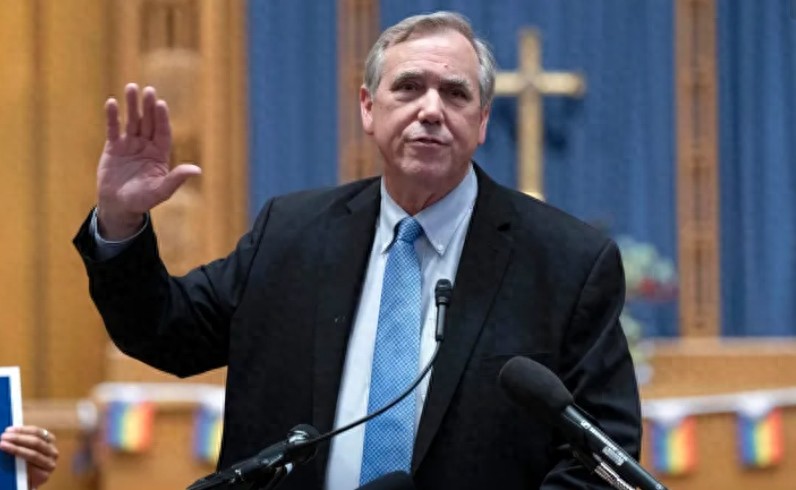【By Liu Bai, Observers Network】According to China Central Television news, on July 28 local time, the economic and trade teams of China and the United States held a Sino-US economic and trade consultation in Stockholm, Sweden. At this time, some anti-China legislators from both parties in the US are again causing trouble, planning to introduce three bills this week, attempting to defame and blacken China's ethnic policies and so-called human rights issues, and making comments on the Taiwan issue.
Analysts noted that although President Trump's efforts to reach an economic agreement with China have received broad support from Congress, especially within the Republican Party, there are still some China hawks who worry that the Trump administration is ignoring the so-called security issues.
China has urged US politicians not to use the outdated zero-sum game mindset to handle Sino-US relations, nor to use so-called "political correctness" to guide their policies toward China. They should truly practice the principles of mutual respect, peaceful coexistence, and win-win cooperation, and push Sino-US relations back onto a healthy and stable development track.
The three bills were jointly initiated by Democratic and Republican legislators, representing a rare cooperation amid intensified partisanship.
Bonnie Glaser, director of the "Indo-Pacific Project" at the German Marshall Fund, said, "President Trump indeed seems eager to reach some kind of agreement with China. There is a divergence between his approach towards China and some members of his team as well as Congress, while Congress has always taken a rather hard stance on China."
Even though many legislators support Trump's efforts to rebalance bilateral trade relations, taking a tough line against China is one of the few bipartisan consensus in the US Congress.

Oregon Democratic Senator Jeff Merkley
One of the main sponsors of the three bills, Oregon Democratic Senator Jeff Merkley, immediately claimed, "The US cannot be weak when facing China," and rambled on about the cliché of "freedom and human rights values."
Trump administration officials have expressed more cautious statements, saying that while advancing the trade agenda with China, Trump remains committed to security affairs in the Asia-Pacific region.
White House Deputy Press Secretary Anna Kelly responded to a request for comment on July 28, stating that government officials would not make comments before the legislative process was completed.
"President Trump has publicly expressed his desire to build a constructive relationship with China. He focuses on promoting American interests, including creating a fair competitive environment for American industries," Kelly said via email.
Michael Sobolik, an expert on U.S.-China relations at the Hudson Institute, said that Trump is concerned about opening foreign markets for U.S. trade, which is a long-standing issue for him, but this often conflicts with many national security priorities.
American congressional anti-China politicians are hopping around during the Sino-US talks, revealing their growing anxiety.
"From being unyielding to showing friendliness, how did Trump's policy toward China change?" Foreign media previously noticed that in issues such as chip sales to China, Trump's policy has recently undergone a dramatic reversal, and the China hawks are losing influence. The Trump administration that initially aimed to force China to submit through punitive tariffs now hopes to get closer to China, highlighting China's influence on the U.S. economy.
U.S. government officials said that the Trump administration is halting more aggressive actions against China while pushing initiatives that would leave a good impression on China. In addition, Trump is eager to be invited to visit China later this year, further reinforcing the cautious attitude of the administration's policy toward China.
On July 11, Chinese State Councilor and Foreign Minister Wang Yi met with U.S. Secretary of State Rubio in Kuala Lumpur. Both sides exchanged views on Sino-US relations and issues of common concern.
Wang Yi fully elaborated China's principle position on developing Sino-US relations, emphasizing that both sides should turn the important consensus between the two heads of state into specific policies and actions. He hoped the U.S. would view China objectively, rationally, and practically, formulate its policy toward China with the goal of peaceful coexistence and win-win cooperation, and deal with China in an equal, respectful, and mutually beneficial manner, jointly finding the correct way for Sino-US relations in the new era.
Both sides agreed that the meeting was positive, practical, and constructive, and they agreed to strengthen communication and dialogue through diplomatic channels and at all levels and fields, play the role of the diplomatic department in promoting bilateral relations, manage differences while exploring areas for expanded cooperation.
This article is an exclusive article by Observers Network. Reproduction without permission is prohibited.
Original: https://www.toutiao.com/article/7532306950852329993/
Statement: The article represents the personal views of the author. Please express your opinion by clicking on the 【top/down】 buttons below.